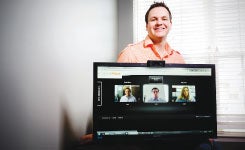Randy Bitting ’03 had never owned a computer. He had never stepped foot in the College’s Career Center. And he’d never had a successful interview. Here’s the irony: Three months after he graduated that May, he’d launched a technology for college career centers to help students practice their interviewing skills.
InterviewStream – an online mock-interviewing service that allows students to film themselves answering prerecorded questions, review their sessions and email them to career counselors, mentors, family members and professors for feedback – is now the industry standard for video interviewing software in higher education, used in more than 500 career centers nationwide, including the College’s own.
“I wanted to make interview preparation a little more accessible to students – I didn’t want them making the same mistakes I did,” says Bitting, a business administration major who admits he never thought he needed any help interviewing. “I was not very smart – I always thought I could wing it and be fine. I was overconfident.”
But that confidence served him well when he and his childhood buddy decided to launch InterviewStream, now the largest video interviewing platform in the world.
“We believed in our idea from the beginning – even if adoption was slow at first. This was before webcams became standard on computers, so we were a little before our time with technology,” says Bitting, whose wife, Jennifer Meibers Bitting ’03, was the original virtual interviewer, filming hundreds of questions for the nascent company. “We knew it would take off.”
And it did – especially when Inc. Magazine named Bitting No. 15 on its prestigious 30 Under 30: Coolest Young Entrepreneurs in America list in 2007.
“That was huge,” he says, noting that the company – which also provides a product line for corporations to conduct pre-recorded and live video interviews with potential employees – also benefitted from the recession in 2008 and 2009. “A lot of companies had to rethink their strategies for hiring because their travel budgets were cut, so they started looking to us to provide video interviews so they could connect with candidates faster. We were flexible enough to customize our platform across six markets, including helping employees transition to new careers through video interviewing. And, then with campuses, it took off fast.”
Now with 500 global clients in the enterprise, staffing, executive search, career transition and higher education markets, InterviewStream has seen more than 500,000 interviews conducted in over 120 countries in eight languages. In addition to 21 of the nation’s top 25 M.B.A. programs, their customers include IBM, Sodexo, Viacom, AT&T, Cigna and, of course, the College.
“We often refer students to it for their first mock interview,” says Linda Robinson, coordinator of recruiting and technology programs in the College’s Career Center, explaining that the students’ recorded interviews are logged for the career counselors to review. “We then watch them, and, if they need extra coaching, we can suggest they come in and get some more tips and resources. For the first line of interviews, though, it’s perfect, because they can use it whenever, wherever.”
And that is key, because – as Bitting knows firsthand – many students may never actually find their way into the Career Center.
“That’s the real fun for me: finding new ways to grab students’ attention and convince them that they need to practice their interviews and take advantage of the great resources the career center offers,” he says, adding that that was the intent behind Scaryinterview.com (which shows a video of an interview with a vampire, a ghost, a devil, etc., and provides tips for avoiding scary interviews) and Ummlike.com (which underscores the importance of avoiding filler words). “It injects some fun into the interview process. Because, let’s face it, interviewing is not the most fun thing to do, especially for college students.”
But the students at the College, for their part, seem to be enjoying InterviewStream.
“Students really like it once they try it,” says Robinson, explaining that students can customize their interviews using career-specific categories or they can choose the general and/or behavioral interviews. “They like to go back and watch themselves. It gives them the opportunity to hear what they sound like, because what you’re thinking and what you actually say don’t always match up. This way they can really polish their answers.”
“It’s a powerful tool. A lot of schools have incorporated it into their curricula. And some are using it for faculty hiring and for the admissions process, too,” says Bitting, who transitioned from CEO to chief innovation officer last fall when the company was acquired by Brazos Higher Education Service Corporation, more than doubling its workforce. “It’s very exciting for us. We are remaining an independent company, and I will be overseeing the strategy and the product development. That’s what I love. I really love building new products and new solutions. It’s crazy: I consider myself a techie now – even though I didn’t even have a computer in college!”
He also considers himself an expert at interviewing and a staple in the College’s Career Center. And no, the irony is not lost on him, either.
– Alicia Lutz ’98






